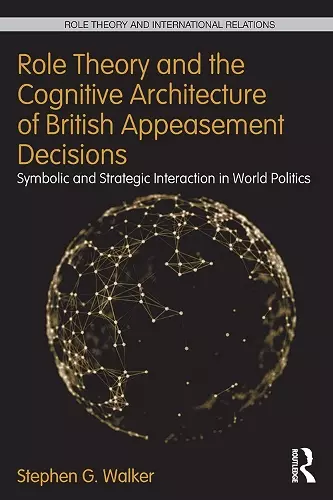Role Theory and the Cognitive Architecture of British Appeasement Decisions
Symbolic and Strategic Interaction in World Politics
Format:Paperback
Publisher:Taylor & Francis Ltd
Published:16th Dec '14
Currently unavailable, and unfortunately no date known when it will be back
This paperback is available in another edition too:
- Hardback£150.00(9780415832359)

Appeasement is a controversial strategy of conflict management and resolution in world politics. Its reputation is sullied by foreign policy failures ending in war or defeat in which the appeasing state suffers diplomatic and military losses by making costly concessions to other states. Britain’s appeasement policies toward Germany, Italy, and Japan in the 1930s are perhaps the most notorious examples of the patterns of failure associated with this strategy. Is appeasement’s reputation deserved or is this strategy simply misunderstood and perhaps improperly applied?
Role theory offers a general theoretical solution to the appeasement puzzle that addresses these questions, and the answers should be interesting to political scientists, historians, students, and practitioners of cooperation and conflict strategies in world politics. As a social-psychological theory of human behavior, role theory has the capacity to unite the insights of various existing theories of agency and structure in the domain of world politics. Demonstrating this claim is the methodological aim in this book and its main contribution to breaking new ground in international relations theory.
"This book unequivocally demonstrates the theoretical and empirical utility of role theory for IR while at the same time providing new insights into British foreign policy in the 1930s. Walker’s mix of historical narrative and formal analysis is unexcelled. All those concerned with agents and structures will find this book enlightening and refreshing—a must read."
—John Vasquez, University of Illinois at Urbana-Champaign
"Observers of world politics have long agreed that Britain's decisions to appease Imperial Japan, Mussolini's Italy and Hitler's Germany contributed to the outbreak of World War II, but they have proposed varying explanations for those decisions. Drawing upon both archival evidence and mathematical analysis, Stephen Walker's path-breaking new book develops a compelling case for role theory as a general analytic solution to ‘the appeasement puzzle.’ His conclusion indicates that leaders’ beliefs and preferences provide a powerful explanation for how and why foreign policy decisions are made."
—Ole R. Holsti, Duke University
ISBN: 9780415709477
Dimensions: unknown
Weight: 362g
246 pages